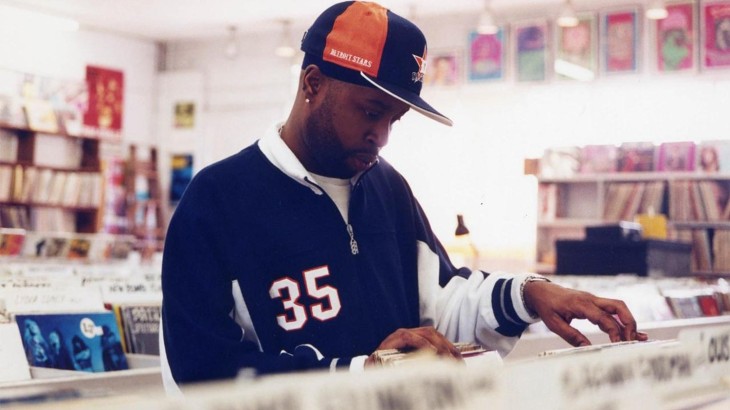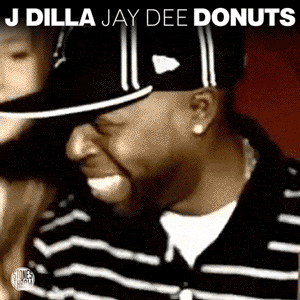Back in 2006 I was just 8 years old, all I really cared about music wise were my brother’s favourite bands at the time, groups like Franz Ferdinand, Arctic Monkeys and Green Day. Little did I know that during February of that year, one of the greatest hip-hop producers ever to live, J Dilla had tragically passed away, shortly after releasing one of the finest albums in the genre’s history.
Fast forward to 2014, through an introduction to hip-hop a few years prior, I now know Dilla’s legacy but only really through his production with some of my favourite artists, including A Tribe Called Quest, The Pharcyde and De La Soul amongs others. At a local record fair I manage to stumble upon a copy of Donuts. Recognising the name, I pick it up. I hadn’t heard anything from the album, but having heard his name listed alongside the greats like DJ Premier, Pete Rock and Q-Tip to name a few, I bought it anyway. I went home, put the record on and chucked on a pair of headphones, only to be blown away with sheer amazement and confusion. The project feels so hard to explain, but touched me deeply, and still gives me shivers to this day.
The importance of this album doesn’t solely lie in Jay Dee’s production as you may think. Despite it obviously being a large part of it, there really is so much more. During this time, hip-hop of the mid-2000s was seeing a huge soul and funk resurgence, with Kanye West at the helm. Producing what they called ‘chipmunk breaks’, Kanye would drastically pitch up samples, giving the samples a high-pitched sound, like a chipmunk.
“It was basically cats rhyming over these old soul ballads on 45, and I was like [to Dilla], [Donuts] is almost your answer to that. A lot of them cats were bringing back the soul records, but I’ma show you, just one more time, how to do it,” Questlove explained. “What Donuts represented was a return to the old soul loops and old Motown breaks”
To contextualise it further, in early 2002 Jay was diagnosed with a rare blood disease known as TTP along with lupus, which caused many complications throughout his career. One particular time in 2005, he had once again fallen ill, but as Peanut Butter Wolf (founder of Stones Throw) explained, “He always bounced back.” This time was different though.
Forced to head into hospital for an extended stay, the vision for Donuts came about. His friends from Stones Throw came to visit, bringing him a sampler and a small 45 record player. From here, his friends and family would bring records in when they came to visit, allowing Jay to constantly be making beats. Realising the vision for the project, while still in hospital he completed 29 of the 31 songs on Donuts, making for an extremely foreboding and emotional release.
Jay Dee passed away just three days after Donuts’ release, a painfully sad instance for many, and a scenario which bares many similarities to David Bowie’s recent death following his farewell album Blackstar.
Donuts is as raw and pure as a beat tape can be. 31 tracks deep, Jay blends many styles throughout, flexing his unbeatable beat-making talents with sharp transitions, where the imperfections are indeed what makes it perfect.
Opening with the short but sweet Donuts (Outro), the incredible Workinonit follows, with a choppy beat, killer guitar riffs, soulful vocal stabs and grooving drums. Setting the scene for the show to come, it verifies that this isn’t going to be just another boom bap beat tape.
A change of style completely, Waves marks the beginning of the heavily soul-influenced beats. Seamlessly sampling 10cc vocals, Dilla makes this into a bouncing and grooving beat, proving he can make anything soulful. Interjected with the in-your-face experimental tracks Light My Fire and The New, these beats shine light on what’s to come.
Returning to a soulful place, Stop samples Dianne Warwick‘s lyric “You’re gonna need me one day, you’re gonna want me back in your arms,” alongside a Jadakiss hook which sounds like “What is death?” This is just one of the many examples where Dilla flips these samples into his life or death scenario, looking at the perception of mortality. A special moment comes when Warwick says “Stop!” and the track takes a minor pause. The afro-beat-influenced People further exemplifies these practices, with the rearranged sample saying, “people, the time has come,” as if ready for what’s next.
Track 10, and my favourite beat off Donuts, is the super smooth Time: The Donut of the Heart. I get shivers every time I hear this track, and I flash back to the times I’d bump this in high school, trying to deny the irresistible urge to nod so that I wouldn’t get caught. With its extremely moving Jackson 5 sample, along pulsing vocals, and pulsing drums, this is arguably one of the most beautiful beats of all time, with each loop pulling you further and further into the groove.
One of the best examples of Dilla’s amazing sampling methods cuts in soon after. Chopping in and around the vocals, the underlying beat behind Airworks staying the same, while all these extra samples develop around it, constantly changing the beat so that there’s no repetitive feel whatsoever.
To contrast, Lightworks, Stepson Of The Clapper and The Twister follow, a trip down Dilla’s punchy experimental production style. While Lightworks is an undeniable banger, with a bouncing bassline and spaced out samples, Stepson Of The Clapper and The Twister prove to be two of the most outside beats. Despite having similar percussion to Lightworks, the repetitive and zany samples breed a sense of unease, only to be varied again when the following track hits.
Playing out so seamlessly, as though a soul record itself is Two Can Win. Despite being a reinterpreted sample, it cuts cleanly and creates the illusion of a loop. Don’t Cry takes this method and expands on it even further, this time in a much more melancholic way. With the sample, “I can’t stand to see you cry” becoming rearranged soon after, the beat plays out under the appearance of a perfect loop once again.
The following beats return to the boom-bap theme touched on previously. Anti American Graffiti’s heavy guitars, hard-hitting drum line and powerful vocals are an interesting contrast to the wailing, East Coast-inspired Geek Down. Thunder is yet another a dark tune, this time accented with a deep piano sample, where the repetitive groove leads into another album highlight. It’s no wonder Nas rapped over Gobstopper for his recent single The Season, there’s just something about these horns and brass on that touch your soul and makes for such a moving beat. With the acoustic bass and rough, booming drums, it’s certainly one of the standouts of the collection.
One For Ghost and Walkinonit are yet more tunes which superbly chop the original artists’ voices. The former flips the phrase, “When I was bad,” in and out from the instrumental, while the latter is much rougher and more melancholic cut, a simple loop from Walk On By, with interjecting segments that end on a harrowing chorus of “Baby walk on by.”
Another crazily experimental tune is The Factory, soon to be contrasted by the beautifully soulful ULove. The simple loop revolves around a beautiful piano ballad, with the vocals rearranging to what is likely a message to his friends and family: “I really love you.”
As we get to the closing stages of the project, Jay masterfully rearranges two more tracks for Hi. and Bye. (Bye. flipping the same sample he used on So Far To Go.) Altering both instrumentals, plugging their soothing vocals in and out as the foundational groove drills away, he even changes the tempo entirely, creating a completely new vibe for each selection.
The final beat of the album, Last Donut Of The Night is simple, yet amazing. With a moving string driven hook, looping guitar twangs and snapping drums, this is an incredibly fitting closure to the project, and an emotional farewell to Jay.
Abruptly slamming into the finale, Donuts (Intro), sampling the eerily titled When I Die, this is Dilla’s goodbye. The name, (Intro), implies there’s more to come – perhaps an ode to the afterlife, or a new age of hip-hop. Either way, Dilla leaves us all thinking about what his message really was throughout the project.
There’s no doubting the legacy J Dilla left behind, changing the craft entirely and inspiring countless others. Where his past projects The Shining and Welcome 2 Detroit laid the foundation, through Donuts, he told an entire story without saying a single word himself. Taking us on a journey through chaos, sorrow, happiness and love, this is a dramatic goodbye to one of hip-hop’s greatest.
Ten years on, there’s no doubting Dilla as one of the greatest to ever grace the pads. RIP J Dilla
Image: Red Bull


